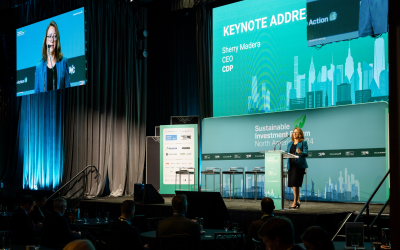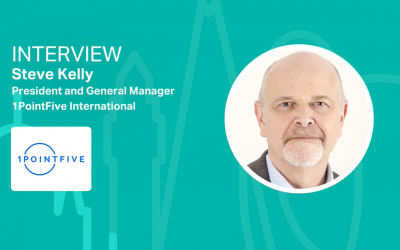Interview with Dirk Forrister, CEO and President of IETA
Climate Action caught up with Dirk Forrister, CEO and President of the International Emissions Trading Association (IETA), on the future of carbon markets and their key role in the upcoming Innovate4Climate week

Countries around the world are committed to implementing their national climate strategies or NDCs as a part of the Paris Agreement on climate change. According to the World Bank Group, the investment needs embedded in these plans amount to US$23 trillion in emerging markets alone, representing a significant opportunity to grow the global economy.
The new annual Innovate4Climate, Finance & Market Week, to be held this year in Barcelona on 22-25 May, will gather government, business and finance leaders to discuss innovative solutions to scale up low carbon investment.
Climate Action caught up with Dirk Forrister, CEO and President of the International Emissions Trading Association (IETA), on the future of carbon markets and their key role in the upcoming Innovate4Climate week.
Firstly, could you please introduce IETA and what you do?
IETA is an international business association that promotes market-based climate policies. Our 135 members cover the wide spectrum of businesses involved in carbon markets, from energy and industrial firms to those providing financial, market, legal or advisory services. To support the Paris Agreement, we are working with policymakers from Europe to China to North America on implementation of carbon market policies.
Our vision is to help form linkages between these markets over time, to ensure that climate goals can be met at lowest economic cost. That way, businesses will have flexibility to make the low-carbon transition, while they continue to grow and prosper.
What are some of the key challenges to developing an effective and active global carbon emissions market?
The toughest challenge is competitiveness. Every jurisdiction pursuing a carbon market faces a political charge that it is “going it alone” while competitors are “doing nothing”. This may have been true for the first movers in the UK or Europe or even RGGI, California or Québec in North America. But now it’s a red herring. Many jurisdictions are pricing carbon. That said, most of them are adopting competitiveness provisions, such as the use of free allocation for trade-exposed industries. Ultimately, the best solution to competition concerns is linkage between systems, which enables all participants covered by those systems to access the same carbon price. This would deliver the ultimate level playing field in climate policy.
The second major challenge is overlapping policies, such as fuel-specific mandates, subsidies and tax breaks. It’s a real temptation for policymakers to adopt a whole suite of climate policies, rather than relying on a solid market mechanism to achieve the goal. These overlaps add inefficiency. They add cost. And they contribute to surpluses in the market. Over time, IETA urges more reliance on the market mechanism and less of a burden of overlapping policies. If we’re to meet the Paris goal of limiting warming to no more than 2°C, then we cannot afford the inefficiencies of policy overlaps.
You have said that 2017 will be a big year for carbon markets, what do you do think will be some of the most significant developments?
Hands down, the biggest development this year will be the launch of China’s national emissions market. China is the world’s largest emitter, and it recognises the need to act. Chinese enterprises are getting ready to engage in the programme, which will be the world’s largest carbon market.
Second, there is a groundswell of action underway as jurisdictions plan their Paris action agendas. A new carbon market opened in Ontario this year, and others are on the way – notably Mexico, Colombia and other Latin American countries are considering new market policies. We will see legislation to clarify the future of markets in the EU, South Korea and California, and we are expecting the International Civil Aviation Organization to determine the types of carbon assets that will be used in the new CORSIA market in the coming years.
Third, the United Nations is working on rules for Article 6 of the Paris Agreement. This will include accounting guidance for countries, and it will set the terms for a new “mechanism to support mitigation and sustainable development”. That’s UN-speak for a market mechanism to replace the Clean Development Mechanism and Joint Implementation programme of the Kyoto Protocol.
IETA has previously been a co-organiser of CARBON EXPO and is now a co-organiser of the inaugural Innovate4Climate, Finance & Market Week. What were your motivations behind your involvement with this event and what do you hope will be its main outcomes this year?
IETA believes in bringing people together to share ideas, make contacts and do business. With the World Bank and other partners, we produce yearly carbon forums in every region of the globe. It has been important for us to support one major global forum that ties it all together. CARBON EXPO had a valiant run for 15 years. Now, we are thrilled to maintain our longstanding partnership with the World Bank on the I4C event. We saw value in a fresh new model for the post-Paris era. We hope I4C maintains its posture as the largest global gathering of market and financial professionals dedicated to climate protection.
You will be speaking at Innovate4Climate. Could you give us a brief outline of what you will be discussing?
I enjoy the exciting position of chairing a session on the growth of carbon pricing around the world. There’s so much happening – I think participants will benefit from hearing about it all in one place. We’ll talk about the EU, China, Korea as well as the US states, Canada and Mexico. We will also explore how these markets will expand to deliver the low carbon future envisioned by world leaders in Paris in 2015 – and where the business opportunities and challenges will appear. I also hope to shine a light on the ways that markets can help generate the climate finance needed for meeting this challenge.






